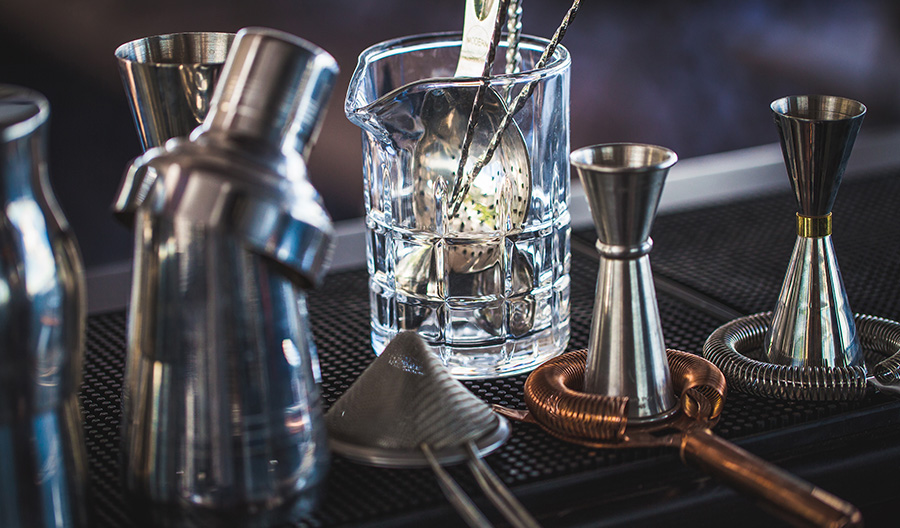Being a good bartender involves a lot more than slinging shots or fancy bottle flipping. True professionals can spend years mastering complex concepts like flavor theory, mixology, and beverage production. In addition, the practical skills to running a bar and serving the public matter just as much as the actual drink making. For those who are newer “behind the stick,” here are six secrets to help you take your bartending game to the next level.
1. Learn the Lingo
As with any industry, bartending is awash with specialized terminology and jargon. And the sooner you learn the language, the better off you’ll be. What’s the difference between a dash and a splash? Still get confused by neat, up, or straight up? The term “back” pops up frequently and seems to mean something different every time. Liquor vs. liqueur, crème vs. cream, aperitif vs. digestif—the list can feel endless. If you are new to bartending, you shouldn’t expect to learn everything overnight, but you do want to get the terminology down as quickly as you can. Learning on the job is stressful enough without having to Google a word every five minutes.
2. Don’t Neglect the Prep
There’s no getting around it. To make those fabulous cocktail concoctions efficiently and consistently, you can’t cut corners on the prep work. The amount of work that goes on behind-the-scenes to prepare for just a few hours of bartending is often surprising to newcomers. Whether it’s making syrups, preparing garnishes, or juicing, juicing, and more juicing, prep makes up just as much of the job as the actual drink-making. Prep work isn’t glamorous or exciting, but the sooner you come to terms with this necessary evil, the better. Take it from the pros, all it takes is a few instances of being underprepared to gain a whole new appreciation for just how important prep work truly is.
3. Manage Your Materials
The most stressful part of a shift often has nothing to do with the drinks. Running out of red wine glasses or not being able to find the mixer you need when the orders are piling up is its own special brand of stress. That’s why knowing how to manage your materials is a crucial part of being a good bartender. To minimize potential roadblocks, you’ll want to:
Prepare and plan accordingly
Clean as you go
Make good use of your downtime
It’s worth taking the time before your shift begins to think about the things you’re most likely to need and organize them so that you can access them as easily as possible. This might take some trial and error, but it makes a huge difference. Cleaning as you go can also be a total game changer—for better or worse. For instance, dumping a used shaker in the sink and moving on to the next drink might feel faster in the short term, but at some point you’ll have a full sink to contend with and nothing clean when you need it—which will, of course, be when things are busiest. It’s far more efficient to clean a little all night long rather than letting things pile up. And as tempting as it may be to take a breather during downtime, do yourself a favor and put that time to good use by gathering glasses, re-stocking low products, prepping more garnishes, etc.

4. Perfect Your Pour
How you pour a drink is just as important as what you’re pouring. There are advocates on both sides of the jigger vs. free pour debate. But regardless of the camp you personally fall into, you need to be comfortable making drinks using both methods. Jiggers are very beginner-friendly; just make sure you can visually identify the different measurement amounts and get comfortable using them in either hand. Free pouring takes a bit more practice. You want to get to where you can free pour ½ oz to 4 oz accurately, every time. Before your shift, fill an empty liquor bottle with water, add a pour spout, and practice pouring using the counting method. A 1-oz pour is two counts (one one-thousand, two one-thousand), a 1.5 oz pour is 3 counts, and so on. Practice this until it becomes second nature—then do it all over again using your other hand.
5. Batch when you can
If you find yourself making the same popular cocktails over and over again, consider batching those babies! You’ll save yourself a ton of time by cutting down on the number of bottles to grab and ingredients to measure—which adds up big time in a busy bar. Batching properly takes a bit of research and care due to oxidation and shelf-life intricacies, so asking a more experienced bartender for assistance (if one is available) is always a good idea. Note: if your particular state’s laws prohibit you from batching booze, you can still split the spirits from the mixers and have those non-alcohol components ready to go.
6. Take care of your regulars
Practical skills aside, we’d be remiss not to mention the other huge component of successful bartending: customer service—especially with your regulars. These fine folks are the lifeblood of any bar, and taking care of them isn’t just good hospitality, it’s good business. Take the time to learn their names and their drink order. Try asking “would you like your usual” or just “the usual?” rather than the name of the drink, as it feels more personal. Pay attention to small touches or special preferences and do them without being asked. Offering the occasional friends-and-family discount can foster a lot of goodwill (and better tips). Just be sure you are clear on your establishment’s rules around comps and discounts. Involve loyal customers behind the scenes as taste tasters for new drinks before they hit the menu and take the time to make sure they have a way to get home safely. Investing in your relationship with your regulars pays off well in the long run.
With these six secrets in your back pocket (and lots of practice), you’ll be in good stead to flex those cocktail skills and become the incredible bartender we know you can be.

